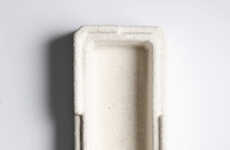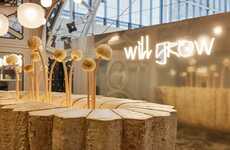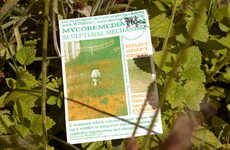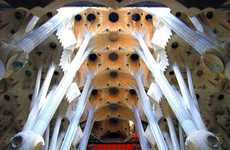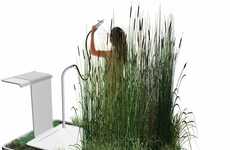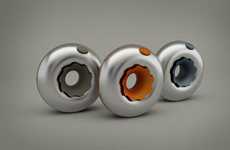
Eco-Alternative to Expanded Polystyrene Structural Insulation Panels
Katie Cordrey — March 5, 2009 — Social Good
References: ecovativedesign & thisoldhouse
Greensulate™ is a sustainable insulating building material composed of rice hulls, recycled paper, and most important, mushroom fibers. It has the ability to resist temperature change, repel water and promises meet ASTM International fireproofing standards.
Ecovative Design is also testing the material’s resistance to mold-growth when water-saturated. The Greensulate™ bio-insulation may be available in the marketplace as early as 2010.
Rensselaer Polytechnic Institute classmates from Gavin McIntyre and Eben Bayer created Bayer’s idea for insulation from oyster mushrooms by growing it on perlite in experiments under McIntyre’s dorm room bed. The Troy, New York pair has since patented and are marketing the material.
Contact Information
Ecovative Design website
Ecovative Design on Facebook
Ecovative Design on Twitter
Ecovative Design is also testing the material’s resistance to mold-growth when water-saturated. The Greensulate™ bio-insulation may be available in the marketplace as early as 2010.
Rensselaer Polytechnic Institute classmates from Gavin McIntyre and Eben Bayer created Bayer’s idea for insulation from oyster mushrooms by growing it on perlite in experiments under McIntyre’s dorm room bed. The Troy, New York pair has since patented and are marketing the material.
Contact Information
Ecovative Design website
Ecovative Design on Facebook
Ecovative Design on Twitter
Trend Themes
1. Sustainable Building Materials - The development of alternative building materials, like Greensulate, can revolutionize the construction industry by providing eco-friendly, cost-effective, and long-lasting solutions for insulation, roofing, and other construction purposes.
2. Bio-insulation Innovation - The innovative use of mushroom fibers and other bio-based materials for insulation has great potential to disrupt the traditional insulation industry by offering a sustainable, safer, and more efficient alternative to hazardous materials like expanded polystyrene.
3. Mold-resistant Materials - The use of Greensulate and other mushroom-based materials for building insulation can provide a solution to the common problem of mold growth in water-saturated environments, creating opportunities for industries such as construction, environmental engineering, and agriculture.
Industry Implications
1. Construction - Innovation in bio-based insulation materials such as Greensulate can transform the construction industry by creating more sustainable and energy-efficient buildings.
2. Environmental Engineering - Mushroom-based insulation materials like Greensulate have potential for use in environmental engineering projects, such as erosion control, water conservation, and habitat restoration.
3. Agriculture - The use of agricultural waste, like rice hulls, in materials like Greensulate can create new opportunities for sustainable farming practices and reduce environmental impact in the process.
6
Score
Popularity
Activity
Freshness

